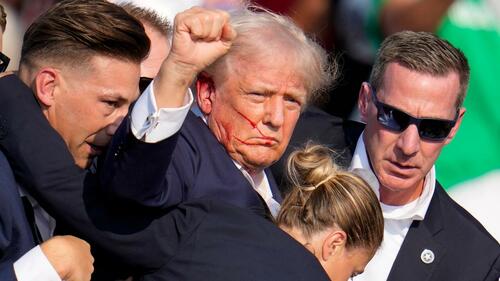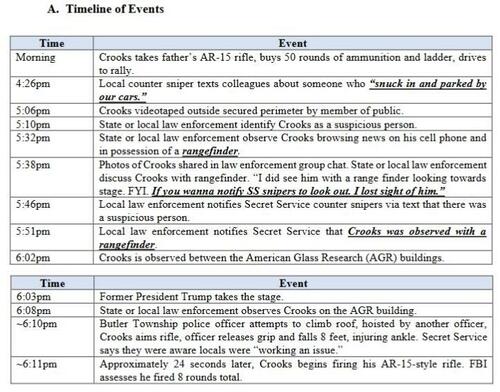Bombshell Whistleblower Report Exposes Major Security Failures In First Trump Assassination Attempt
With Donald Trump now the target of two assassination attempts in two months, a new whistleblower report released by Senator Josh Hawley (R-MO) has unveiled a series of alarming security lapses by the U.S. Secret Service (USSS) and other federal agencies during the attempt at a rally in Butler, Pennsylvania, on July 13, 2024.

The report, based on information provided by multiple whistleblowers, highlights a pattern of incompetence, mismanagement, and inadequate preparation by the agencies responsible for safeguarding one of the most high-profile figures in American politics.
The report reveals that systemic failures, poor decision-making, and a lack of proper resource allocation within the Secret Service contributed to what is being described as a near-catastrophic breach of presidential security. These findings have sparked a call for urgent oversight and reform of the agency, raising serious questions about its ability to protect national leaders.
Gaps in Security Protocols and Poor Decision-Making
Among the most critical allegations in the whistleblower report is the Secret Service’s decision not to conduct a standard evaluation of the rally site. The Counter Surveillance Division, tasked with identifying potential threats, was notably absent during the event. This failure was compounded by the fact that the Secret Service reportedly declined multiple offers from local law enforcement to employ drone surveillance technology at the rally. The decision was particularly consequential, given that the would-be assassin himself used a drone to conduct surveillance of the rally site hours before launching his attack.

In a striking lapse, law enforcement personnel abandoned a rooftop surveillance position due to hot weather conditions. This rooftop was subsequently used by the shooter to fire shots during the rally, nearly succeeding in his assassination attempt. The report suggests that a significant security breakdown occurred because of a lack of counter sniper coverage and the absence of a coordinated response.
What’s more, the lead Secret Service agent responsible for site security during the rally was also flagged for a history of incompetence. This agent, who had previously been cited for failing to follow established security protocols, was nonetheless placed in charge of protecting the former president. The report raises questions about how and why this individual was entrusted with such a critical role.
Whistleblowers told me that the lead site agent at the Butler rally was someone who wasn’t trusted by other Secret Service agents and didn’t know what she was doing.
Why are these people running security for a former President and a major party nominee? pic.twitter.com/FPxPGA8yGM
— Josh Hawley (@HawleyMO) September 16, 2024
Resource Denial and Inadequate Training
According to whistleblowers, agents on the ground were discouraged from requesting additional security resources, with explicit instructions that such requests would be denied. This led to a situation where those responsible for protecting the former president were left under-resourced and vulnerable. The rally itself was reportedly covered by Department of Homeland Security (DHS) agents who were reassigned from other duties, such as child exploitation cases, with only a two-hour webinar as preparation. Such minimal training, the report claims, was grossly inadequate for the complexities of protecting a high-profile target like Trump.
The whistleblowers further allege that the Secret Service’s Counter Surveillance Division faced significant cuts in both funding and personnel. These reductions were purportedly directed by Acting Director Rowe, who has yet to respond publicly to these claims. These resource cuts, whistleblowers argue, directly impacted the agency’s ability to maintain the level of vigilance needed to thwart potential threats.
Internal Concerns and Allegations of Retaliation
The report also raises concerns about internal culture and leadership within the Secret Service, suggesting that agents who voiced concerns over security protocols were either ignored or faced retaliation. Some whistleblowers allege that they were subject to pressure or threatened with career repercussions if they raised alarms about inadequate security measures. This internal atmosphere, as depicted in the report, could have contributed to a chilling effect, discouraging agents from advocating for necessary precautions.
Following the attempted assassination, several high-level Secret Service officials were reportedly „encouraged to retire,” a move viewed by critics as an attempt to avoid deeper scrutiny and congressional oversight. This, the report suggests, points to a culture of evasion rather than accountability within the agency.
The whistleblower report highlights the slow response of executive agencies to the inquiries made by lawmakers. Senator Hawley’s office noted that while they had asked for clarifications from both the Secret Service and DHS, the responses have been delayed and lacking in detail. Notably, none of the agencies have outright denied the whistleblower allegations, which has only fueled further concern over the veracity of the claims.
Hawley emphasized the need for a comprehensive investigation and reforms, stating, „These failures expose significant vulnerabilities in our nation’s security apparatus that cannot be ignored. It is imperative that we hold those responsible to account and implement immediate changes to prevent such a failure from happening again.”
Several questions remain unanswered. For instance, why were critical security measures, such as rooftop surveillance and counter-sniper coverage, not enforced? Who within the Secret Service or DHS was responsible for denying requests for additional security resources? And what was the motive behind the assassination attempt, given the assassin’s use of encrypted communications?
Moreover, the report points to broader implications for U.S. security policy. In the wake of the assassination attempt, there is growing pressure on both Congress and the Biden administration to undertake sweeping reforms of the Secret Service. This would likely include revisiting funding levels, personnel training, and perhaps most critically, ensuring a culture of accountability within the agency.
The Biden administration has so far not commented directly on the findings of the whistleblower report. However, lawmakers from both parties are expected to press for further hearings and investigations into the matter.
A Call for Whistleblower Protections and Further Reforms
Hawley has promised protections for any new whistleblowers who provide additional information on the Secret Service’s failures. „We cannot afford to sweep these issues under the rug,” he said. „The American people deserve a transparent and accountable government, and that starts with a thorough investigation into these alarming revelations.”
Tyler Durden
Tue, 09/17/2024 – 10:45

